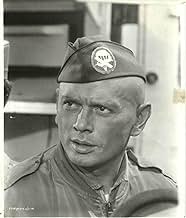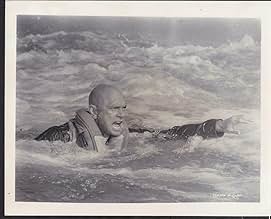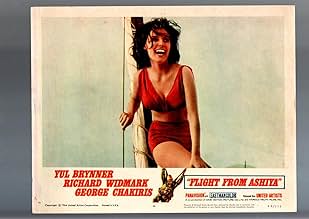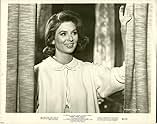A flight crew tries to save the survivors of a shipwreck off the coast of Japan during a raging typhoon.A flight crew tries to save the survivors of a shipwreck off the coast of Japan during a raging typhoon.A flight crew tries to save the survivors of a shipwreck off the coast of Japan during a raging typhoon.
Eiko Takashiro
- Tomiko
- (as Eiko Taki)
Joe Di Reda
- SSgt. Randy Smith
- (as Joe di Reda)
Paul Frees
- Narrator
- (voice)
- (uncredited)
Thomas Korzeniowski
- Sergeant Garrison
- (uncredited)
Featured reviews
I had expected lots of action and I got it but it was of the dreary melodramatic romantic type and not of the shooting type. It's no surprise that the release was delayed by two years as the makers must have realised that it was not very good. The few action scenes were impressive and looked expensive to make which perhaps explains why they were so few in number. The large numbers of flashbacks , essential to the plot, further reduced the enjoyment. A waste of acting talent with a way over the top romantic plot and script. Not one for Richard and Yul to be proud of, but it was not their fault of course.
The screenplay tells the story of three men ,two of whom fought during WW2.Now they all work for Air Rescue Service with a commendable motto.The problem is that the film is far from being commendable.
During a mission,Widmark's dark memories come back to haunt him and ,in the middle of a sea rescue,we're offered a full flashback :he once loved a woman (Shirley Knight),and that is supposed to make us comprehend why he hates Japanese.But if it is bad ,a second flashback (dealing with Yul Brynner's past) is still worse.In a chocolate box North Africa ,he falls in love with an Arab girl -who barely looks Arab anyway.As George Chakiris did not fight during WW2(see above),the director spares us a third flashback,phew! This is a flick where even technical competence is at question and that is very ill-conceived.
During a mission,Widmark's dark memories come back to haunt him and ,in the middle of a sea rescue,we're offered a full flashback :he once loved a woman (Shirley Knight),and that is supposed to make us comprehend why he hates Japanese.But if it is bad ,a second flashback (dealing with Yul Brynner's past) is still worse.In a chocolate box North Africa ,he falls in love with an Arab girl -who barely looks Arab anyway.As George Chakiris did not fight during WW2(see above),the director spares us a third flashback,phew! This is a flick where even technical competence is at question and that is very ill-conceived.
If you want to see this film it helps being not too attentive. This film has a nice surface which promises an entertaining, adventurous film but unfortunately "Flight from Ashiya" instead is full of clichés, stereotypical characters and of often unintentionally funny story lines. "Highlight" is the story of Yul Brynner which takes part in Africa and which involves a super-exotic woman and a doll's house's Africa. The end of this part of the film is ridiculous and at the same time disgusting and a perfect example of the exploitation of a character for a very cheap effect. The most funny is the pathetic narrative voice-over commentary which claims that everything in this film really happened - which indeed would surprise me... All in all "Flight from Ashiya" unfortunately is a perfect argument for all the people who despises classic Hollywood films for being stereotypical and false, which this film surely is.
This is, despite a fairly epic attempt at storytelling and a heavyweight cast, a snoozefest. The pacing is very dry and ultimately predictable and the storyline is trite, contrived and pat. Widmark, Chakiris and Brynner are on a rescue mission and as their plane approaches it's destination, each of them has a flashback to another dramatic time for them. Chakiris' is the most believable as he recalls a tragic rescue attempt of some villagers caught in an icy mountain range. Widmark recalls meeting a photojournalist (Knight) and falling in love against a war-torn backdrop. Brynner remembers meeting a foreign girl (Gaubert) who he can only communicate with visually since they don't speak each others' language. Parker gets the film's most pointless & thankless role as a woman who pines for Brynner back at the base. The film ranges from stodgy to overwrought with many unintentionally amusing moments and some really ripe dialogue. Made at a time when studios were still getting used to a little more freedom with immorality, it wants desperately to be cutting edge and racy, yet is hopelessly old-fashioned and silly. There is NO attempt at period flavor. Knight's story is set in 1941, yet her hair and clothing are early sixties (she even wears a skirt almost identical to Parker's, whose story takes place in 1964!) Her awesome mane of hair could easily have been styled into a neato '40's 'do, but alas, no one did. Widmark and Knight's story tries to cram a two-hour-movie's worth of clichés and dramatics into about 20 minutes. They literally fall hopelessly in love after one plane ride! The same can be said of Brynner's affair. He gives his seat to a girl on a bus and then can't live without her. This whole section of the film is ludicrous, but Gaubert is quite lovely. The ending of this sequence is surreal and jaw-dropping! It must be seen to be believed and is almost worth sitting through the film for. There are worse ways to spend two hours, but this is hardly rewarding entertainment. There is also a hilarious before and after narration by a man who sounds like he did voice-over for army recruitment shorts.
I was surprised to find so few and low rated reviews on this deeply compassionate film about World War II veterans who chose to continue risking their lives by saving lives of others. George Chakiris, Richard Widmark and Yul Brynner have each one their own story to tell of profound human interest, Chakiris battling with a constantly bad conscience for having failed in one rescue emergency operation during the war, Widmark constantly battling with his hatred of the Japanese because of what they did during the war with his love Shirley Knight as a casualty, and Yul Brynner, part Japanese, part Polish, recalling his crushing love affair in Tunisia with a moslem girl he wanted to marry. It's a great film for its very realistic pathos offering an alternative solution to the most common war trauma: not to be able to stop fighting, and usually resorting to drinking or drugs for a bad recompense; but these men channelled their persisting war energy into an Air Rescue Service, battling their guilt complexes and insufficiency traumas by saving and rescuing lives in desperate need. Most of the film is flashbacks from the war, but the situation is of timeless and universal interest.
Did you know
- TriviaThe French expression 'la petite mort' (the little death) refers to orgasm, not love.
- GoofsThe JATO (Jet Assisted Take Off) bottles will last 11 seconds maybe a little more but in the film they appear to last for at least 20 seconds.
- Quotes
Sergeant Mike Takashima: My father was a Buddhist, my mother a Seventh-day Adventist.
- ConnectionsFeatured in American Masters: Waldo Salt: A Screenwriter's Journey (1990)
- How long is Flight from Ashiya?Powered by Alexa
Details
Box office
- Budget
- $1,800,000 (estimated)
- Runtime
- 1h 40m(100 min)
- Aspect ratio
- 2.35 : 1
Contribute to this page
Suggest an edit or add missing content




































